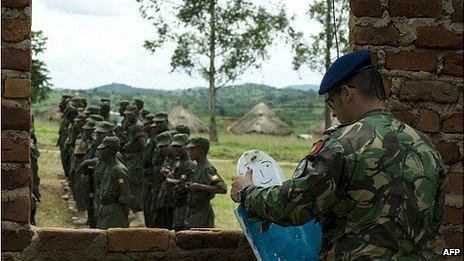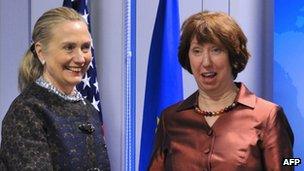EU diplomatic service cautious on tough global stage
- Published
- comments

The EU's work in Somalia, which includes police training, has won praise
Two years ago, with little fanfare, the European Union launched a new foreign diplomatic service. Its remit was daunting - to make Europe "speak with one voice" and punch its weight among the superpowers.
But an idea conceived when the European project was riding high in the 1990s and early 2000s has come to fruition as the EU is mired deep in crisis.
With political will and funding in short supply, the European External Action Service (EEAS) has moved cautiously through the EU's complex bargaining processes and bureaucracy.
"The political juncture is dreadful," says Rosa Balfour of the European Policy Centre, an independent think-tank based in Brussels.
"Because of the whole negative context in which the EEAS was devised, and the attitudes on the part of the member states basically of suspicion and waiting to see it deliver, this has actually meant that the EEAS has been very timid."
People working in the service say its launch was fraught, partly because of delays implementing the Lisbon Treaty that underpins it.
Member states jockeyed for key jobs, and observers say there were turf wars with the European Commission, the EU's executive branch, from which the EEAS inherited some staff and overseas delegations.
The service's first head, High Representative Catherine Ashton from the UK, was widely seen as a compromise candidate lacking long-term diplomatic experience. She was given the equivalent of two or three jobs - remaining a vice-president of the Commission - with no deputy to help her.
Cost-benefit questions
Her operation was to be budget neutral, and modest. Its cost of just under 500m euros (£405m) for 2012 was roughly equal to the defence budget of Slovenia.
Though that is just a tiny part of the EU's overall budget, in straitened economic times spending on the service's headquarters and its generous salaries has provoked criticism, says Mats Persson, the director of Open Europe, a think-tank that calls for EU reform.
"The debate that has to be had is justifying the EEAS's expenditure - there has to be a cost-benefit analysis of the EEAS very soon," he said.
Immediately after the service got to work, it faced a major policy challenge on Europe's southern border - the Arab Spring.
The EU was widely seen as being caught on the wrong side of history, its European Neighbourhood Policy having failed to set tough conditions for co-operation with the region's autocrats.
And as with the other parts of Europe's "neighbourhood" - Russia, and the Middle East - the 27-member bloc was unable to agree on a quick or decisive course of action, notably over military action in Libya.
"When it comes hard power and high politics the influence of the EEAS is very limited," said Mr Persson.
Red tape
Some states are more willing than others to work with, or through, the service.
The UK, wary of "competence creep" - that is, an accumulation of powers in Brussels - has blocked dozens of statements because they were made in the EU's name alone.
Some experts see Germany as more focused on other areas of EU policy, such as energy and eurozone reforms, and France as using the EU's diplomatic machinery to advance national goals, in Africa for example.
Many observers think that development aid - still partly controlled by the Commission - is artificially hived off from other foreign policy calculations, and that a failure to fully integrate trade and energy policy has hampered strategic thinking on China and Russia.
Amid red tape in Brussels and multilateralism on the ground, the impact of policies risks being diluted.
An EU delegation official working in the Democratic Republic of Congo said his office waited two years for its human rights policy to be approved by Brussels, by which time "the situation had completely changed".
He said the EU interacts with all the key players in DR Congo, but that this can lead to endless meetings.
"One risk in all this is that you can easily forget about the Congolese," he said.
More continuity
Yet despite all these challenges, the EEAS is seen to have made some progress.
On a functional level, analysts say there are signs of improved co-ordination both in Brussels and around the world, where heads of delegations can now play a more overtly political role.

Catherine Ashton (right) is said to have developed a strong working relationship with Hillary Clinton
"The machine just works much more smoothly than it used to," said Stefan Lehne, a visiting scholar at Carnegie Europe.
The EU is not itself a state, so cannot carry out some basic diplomatic functions including recognising states and issuing diplomatic passports.
Nor does it formally provide consular services, which require high levels of staffing and training - though some expect it to do so in the future, saving money for some member states.
It has most practical appeal to EU states that lack large diplomatic networks.
"The external action service is very important for small member states and new member states," said Daniel Schaer, an Estonian diplomat seconded to the EEAS in Rwanda.
"It gives them a chance to widen their coverage and get access for their non-resident ambassadors."
Crucially, the service has offered more continuity than under the previous system, when foreign policy was run under a six-month rotating presidency.
The EU's partners "do know who to speak to and do know who's in charge - and it turns out the same person is in charge in the second half of the year as in the first," said Robert Cooper, a former senior EU diplomat. "You can build relationships."
One such relationship is between Baroness Ashton and US Secretary of State Hillary Clinton, said Cesare Onestini, a senior EEAS official.
Unlike her predecessors, Mrs Clinton "is not asking the question of who to phone" when she wants to talk to Europe, he said.
'Integrated diplomacy'
Under Baroness Ashton, the EEAS has won some plaudits for:
Helping to ease tensions between the leaders of Serbia and Kosovo
Despite a shaky start in the Arab Spring, supporting the new leaders in Egypt and Tunisia
Applying pressure for a diplomatic solution over Iran's nuclear ambitions.
It has also begun to develop joined-up strategies that cover development as well as security for troubled regions such as the Horn of Africa and Sahel.
Some see such "integrated diplomacy" - combining classical foreign policy with trade, energy, development and enlargement policies - as offering a new model for dealing with global challenges, including climate change and population growth.
"It is hard to take on the full dimensions of these issues," said Dan Smith, who runs International Alert, a peacebuilding organisation.
"They demand responses which the diplomatic tradition is not used to producing."
He said it was also an opportunity for the EU - the world's largest trading bloc and biggest provider of aid - to make full use of its non-military "soft power".
Whether the EEAS can take this chance, or increase its influence in other ways, will depend on how much backing it gets from member states.
That in turn may depend on whether the euro crisis leads to member states being more or less committed to Europe.
But even some who are sceptical about further integration, such as Charles Tannock, a British Conservative MEP, think the EEAS can play an important role.
"You can't put more than cigarette paper between the views of most of the major European countries on most of the issues," he said.
"Forming lasting alliances with each other within the European Union... is bound to give us more foreign policy influence united than if we were to go alone or divided."
- Published7 December 2010
- Published6 December 2010
- Published30 October 2012